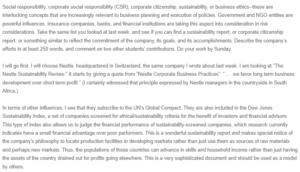Corporate Social Responsibility – Nestle
Nestle’s sustainability policy comprises multiple aspects including climate action, waste reduction, human rights, nature, health, nutrition, responsible business practices, performance, reporting, and raw materials. The policy also highlights the importance of people and communities. Nestle’s principal approach is aligned with the United Nation’s 2030 Agenda for Sustainable Development. The United Nations launched at least seventeen goals that were intended to address the current challenges (Nestle). These challenges that the UN seeks to solve include environmental pollution, climate change, poverty, inequality, peace, and justice.
Nestle actively seeks to fulfill these goals by minimizing its impact on the natural environment. It also promotes good health and nutrition through the products it offers. The company also advocates for respecting human rights within its value chain. As a global employer, Nestle empowers the young by offering them jobs. The company currently offers economic opportunities to at least ten million youths. Other activities that Nestle emphasizes are related to farming. It is critical to ensure that the cocoa farmers are empowered to maximize their farming activities (Nestle).
Promoting environmental sustainability by providing stakeholders with alternative sources of energy is also critical in achieving sustainability goals. To minimize the use of plastics, which pollute the natural environment, Nestle uses paper straw packaging in Brazil. The company also intends to reduce its gas emissions by half by 2030 and achieve zero emissions by 2050. Nestle also engages children to produce innovative ideas that can be used to achieve zero waste. These include reusing, refilling, and recycling (Nestle).
Works Cited
Nestle. Sustainability. 2020. <https://www.nestle.com/stories/nestle-employee-stories-sustainability-climate-change>.
ORDER A PLAGIARISM-FREE PAPER HERE
We’ll write everything from scratch
Question

Corporate Social Responsibility – Nestle
Social responsibility, corporate social responsibility (CSR), corporate citizenship, sustainability, or business ethics–these are interlocking concepts that are increasingly relevant to business planning and execution of policies. Government and NGO entities are powerful influences. Insurance companies, banks, and financial institutions are taking this aspect into consideration in risk considerations. Take the same list you looked at last week, and see if you can find a sustainability report, or corporate citizenship report, or something similar to reflect the commitment of the company, its goals, and its accomplishments. Describe the company’s efforts in at least 250 words, and comment on two other students’ contributions. Do your work by Sunday.
I will go first. I will choose Nestle, headquartered in Switzerland, the same company I wrote about last week. I am looking at “The Nestle Sustainability Review.” It starts by giving a quote from “Nestle Corporate Business Practices”: “… . we favor long term business development over short term profit.” (I certainly witnessed that principle expressed by Nestle managers in the countryside in South Africa.)
In terms of other influences, I see that they subscribe to the UN’s Global Compact. They are also included in the Dow Jones Sustainability Index, a set of companies screened for ethical/sustainability criteria for the benefit of investors and financial advisors. This type of index also allows us to judge the financial performance of sustainability-screened companies, which research currently indicates have a small financial advantage over poor performers. This is a wonderful sustainability report and makes special notice of the company’s philosophy to locate production facilities in developing markets rather than just use them as sources of raw materials and perhaps new markets. Thus, the populations of those countries can advance in skills and household income rather than just having the assets of the country drained out for profits going elsewhere. This is a very sophisticated document and should be used as a model by others.

